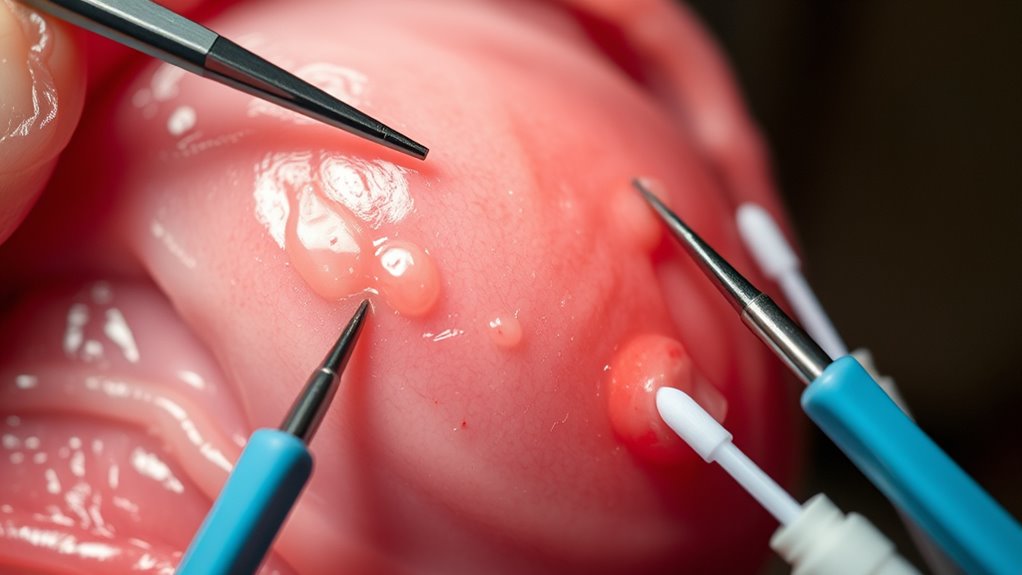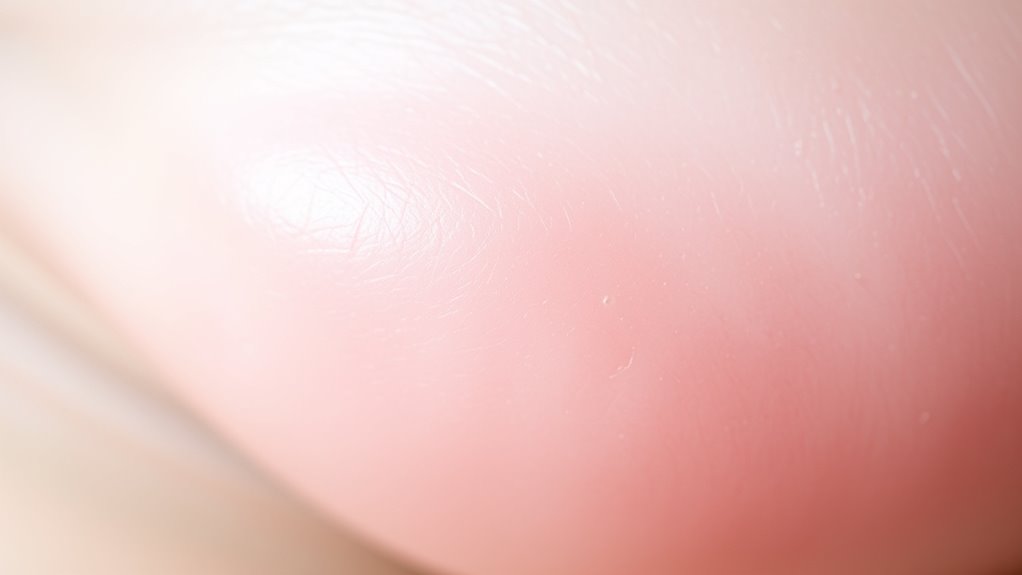A fishy vaginal odor usually signals an imbalance or infection, such as bacterial vaginosis, trichomoniasis, or poor hygiene. You might notice unusual discharge, itching, or irritation alongside the smell. To care for this, practice good hygiene with gentle, unscented cleansers, wear breathable fabrics, and seek medical advice if symptoms persist or worsen. Understanding these causes and effective steps can help restore your comfort, and you’ll discover more tips to keep your vaginal health in check.
Key Takeaways
- Bacterial vaginosis is the most common cause of a fishy vaginal odor due to bacterial imbalance.
- Persistent odor accompanied by unusual discharge, itching, or irritation requires medical evaluation.
- Maintain good hygiene by washing with gentle, unscented products and avoiding douching.
- Medical treatment, such as antibiotics or antifungals, may be necessary if infection is diagnosed.
- Preventive measures include wearing breathable underwear, practicing safe sex, and scheduling regular gynecological checkups.
Common Causes of a Fishy Vaginal Smell

A fishy vaginal smell is often caused by infections or imbalances in the vagina. Bacterial vaginosis (BV) is the most common culprit, resulting from an overgrowth of harmful bacteria that disrupt the natural balance. This infection produces a strong, unpleasant odor, especially after intercourse or during menstruation. Another cause is trichomoniasis, a sexually transmitted parasite that causes a foul smell along with itching and irritation. Poor hygiene, wearing tight or non-breathable clothing, and douching frequently can also disturb the vagina’s natural bacteria, leading to odor issues. Additionally, yeast infections rarely cause a fishy smell but can contribute to discomfort and abnormal discharge. Recognizing these causes helps you understand why the odor occurs and emphasizes the importance of proper hygiene and medical advice. Digital literacy in health information can also empower individuals to make informed decisions about their well-being.
Recognizing Symptoms and When to Seek Help

Noticing a persistent fishy odor is a sign that something may be off with your vaginal health. Pay attention to other symptoms like unusual discharge, itching, burning, or irritation. If the odor is strong, lasts more than a few days, or is accompanied by discomfort, it’s time to seek medical advice. Don’t overlook these signs, especially if they interfere with your daily life or cause distress. While occasional odor might not be urgent, persistent or worsening symptoms require professional evaluation. Consulting a healthcare provider ensures proper diagnosis and treatment. Remember, early intervention can prevent complications and help restore your comfort and confidence. Trust your body’s signals and seek help promptly if you notice anything unusual. Being aware of vaginal health concerns can help you better understand when to seek treatment.
Effective Personal Hygiene Practices

Practicing good personal hygiene is essential for maintaining a healthy and fresh vaginal area. To do this, wash your genital area daily with warm water and a gentle, unscented cleanser designed for sensitive skin. Avoid using harsh soaps, douches, or scented products, as they can disrupt the natural balance of bacteria and cause odor issues. Always wipe from front to back after using the toilet to prevent bacteria from spreading. Wear breathable cotton underwear and change it daily to stay dry and prevent bacterial growth. After bathing, make certain you thoroughly dry the area. Proper hygiene supports a healthy vaginal environment, reducing the risk of odor and infection. Additionally, understanding the data privacy challenges associated with personal health information can help you make informed decisions about sharing sensitive details. Remember, over-washing can be harmful, so stick to gentle routines.
Medical Treatments and When They Are Necessary

Sometimes, despite good hygiene, persistent or unusual vaginal odor may indicate a need for medical treatment. If the smell doesn’t improve with home care or worsens, it’s time to see a healthcare provider. They can diagnose the underlying cause, such as bacterial vaginosis, yeast infection, or other infections. Your doctor may perform a pelvic exam, take samples for lab testing, or recommend specific treatments. Antibiotics are common for bacterial infections, while antifungal medications treat yeast overgrowth. In some cases, hormonal imbalances or other health issues require targeted therapy. Understanding trust issues can also be important, as emotional factors may influence physical symptoms. Don’t ignore persistent symptoms; seeking professional help guarantees proper treatment and prevents complications. Remember, timely medical intervention helps restore your vaginal health and comfort effectively.
Preventive Measures to Maintain Vaginal Health

Maintaining good vaginal health involves simple yet effective preventive measures that you can incorporate into your daily routine. Wash the area gently with mild, fragrance-free soap and water, avoiding harsh cleansers or douching, which can disrupt your natural balance. Wear breathable cotton underwear and change out of damp clothing promptly to prevent bacterial growth. Practice safe sex by using protection and urinating after intercourse to flush out bacteria. Stay hydrated and maintain a balanced diet rich in fruits and vegetables to support your immune system. Regularly monitor your body for any changes or odors, and schedule routine gynecological checkups. Using proper hygiene practices helps preserve your vaginal flora, reduce the risk of infections, and promote overall vaginal health.
Frequently Asked Questions
Can Diet Influence Vaginal Odor?
Your diet definitely influences your vaginal odor. Consuming foods high in sugar, processed carbs, or strong spices can alter your natural scent, making it more noticeable or fishy. Staying hydrated, eating probiotic-rich foods like yogurt, and avoiding excessive alcohol or caffeine can help maintain a fresh, balanced smell. Remember, a healthy diet supports your overall vaginal health and can reduce unpleasant odors.
Are There Specific Foods to Avoid for Odor Control?
Imagine your body as a garden, and what you eat shapes its scent. To keep odors in check, steer clear of spicy foods, strong cheeses, and processed snacks that can intensify the smell. Instead, opt for fresh fruits, veggies, and plenty of water to help flush out toxins. By choosing lighter, natural foods, you support a fresher, more balanced scent and overall vaginal health.
How Does Stress Affect Vaginal Health and Odor?
Stress can impact your vaginal health by disrupting your hormone balance, which may lead to changes in odor and increased susceptibility to infections. When you’re stressed, your immune system weakens, making it harder to fight off bacteria and yeast that cause odor issues. To support your vaginal health, find ways to manage stress through relaxation techniques, exercise, or hobbies, helping to keep your natural balance and odor under control.
Can Natural Remedies Effectively Eliminate Fishy Smell?
Did you know that up to 70% of women find natural remedies helpful for vaginal odor? If you’re wondering whether they can eliminate a fishy smell, the answer is yes, sometimes. Tea tree oil, probiotics, and proper hygiene can improve symptoms. However, if the odor persists, it’s essential to see a healthcare provider, as some infections require medical treatment. Natural remedies may work, but professional advice is always best.
Is It Safe to Use Scented Products Internally?
Using scented products internally isn’t safe and can disrupt your natural balance. These products often contain chemicals that may cause irritation, allergic reactions, or infections. Instead, focus on gentle, unscented hygiene practices and consult your healthcare provider for persistent issues. Your vagina is self-cleaning, so avoid inserting anything that could upset its delicate environment. Prioritize safety and proper care for your health and comfort.
Conclusion
Maintaining good vaginal health is essential, as about 75% of women experience odor issues at some point. By practicing proper hygiene, staying dry, and seeking medical advice when needed, you can prevent and manage a fishy smell effectively. Remember, your body’s signals matter—don’t ignore persistent symptoms. With the right care, you’ll feel confident and comfortable every day. Stay proactive and prioritize your health; it’s the best way to keep that odor at bay.









